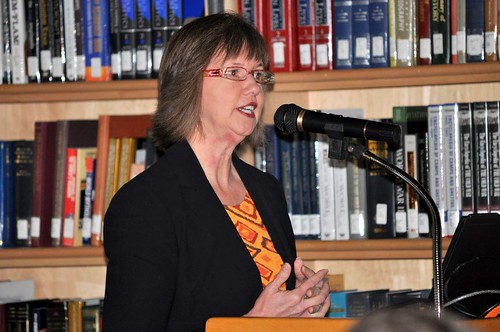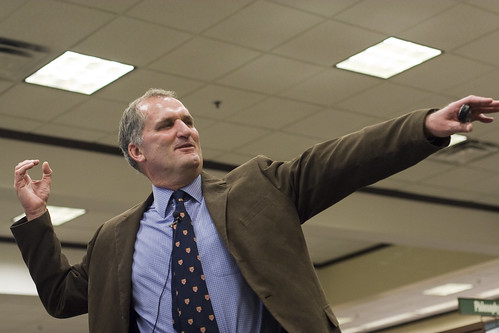 |
Monthly Archives: October 2010
Memorializing the Van Meters
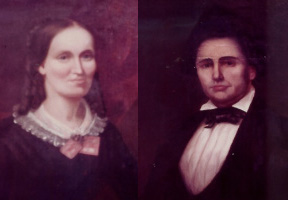
Martha and Jacob Van Meter
Charles J. Van Meter (1826-1913) is remembered in Bowling Green as a pioneer in the development of commerce on the Green and Barren Rivers. His generosity toward the Southern Normal School (now WKU) prompted the naming of Van Meter Hall in his honor.
Charles’s father, Jacob Van Meter, came to Bowling Green in 1818 and grew wealthy as a farmer and merchant. As a state legislator, he also lobbied for public improvements to river navigation and helped build the Bowling Green Portage Railway, a narrow-gauge railroad that carried goods from the boat landing to the center of town.
When 86-year-old Jacob Van Meter died on February 27, 1874, the funeral was planned for March 1 but was delayed for a day when, early that morning, his 82-year-old wife Martha also died. In the florid style so popular with Victorian Americans, the Bowling Green Republican mourned two of the city’s most venerated citizens. How appropriate, declared the paper, that Jacob’s soul “should have been wafted to Paradise with the first breathings of spring.” As a canny businessman, kind neighbor, model father and blameless Christian, Jacob’s character was “solid as marble and unsullied as snow. He has gone down to his grave,” continued the paper, “without stain or blemish, ripe in years and in honors.” Martha Van Meter, similarly, was “a remarkable woman, esteemed and beloved by all who knew her.” And so the tribute when on and on . . . for four long columns of the newspaper’s editorial page, as if emulating Jacob Van Meter’s lifelong motto, never give up.
The obituaries of Jacob and Martha Van Meter are part of the collections of WKU’s Special Collections Library. Click here for a finding aid. For more on Bowling Green’s Van Meter family, search TopScholar and KenCat.
Filed under Manuscripts & Folklife Archives
Kentucky Live presents Nancy Richey
Filed under Events, Flickr Photos, General, Kentucky Live, Latest News, New Stuff, People, Podcasts
Dr. Gordon Emslie speaks on the importance of research in honor of International Open Access Week
Tyranny and Democracy of Knowledge
Gordon Baylis, VP for Research, speaking at the 2nd annual
Open Access Week, Oct. 21, 2010
Dr. Baylis stated that research is essential to teaching. He then traced historical components of teaching formed by content (corpus) and the 7 skill sets of the Trivium and Quadrivium in fascinating highlights of the development of knowledge from breakthroughs of hypertext and connectivity (with LOL being the very first letters ever transmitted) to the fact that data is now stored in exabytes. He characterized the initial corpus of knowledge as that which has been balkanized and sub-balkanized over the decades, if not centuries. The amount of data we are faced with leads to a tyranny of access, as in Wikipedia. That site is openly accessible and highly democratic, but questionable in content at times, particularly during election seasons. Google indexes .04% of available content. As educators, we can focus on 4 elements of knowledge: the body of knowledge (corpus); production of knowledge; assessment; and application (how it bears on society’s issues). Peer review takes care of the assessment; beyond that we have to teach people how to assess. His conclusion paved the way for challenging questions and future conversations.
Filed under Events
Open Acces Week Event coming up at Helm
Join us for the second annual celebration of Open Access Week, an international week that recognizes the value of research with the theme: “Learn. Share. Advance.” Open Access is the principle that research should be accessible online, for free, immediately after publication and at any time. TopSCHOLAR® offers such a platform for publications and other content. WKU Libraries invites everyone to attend the key event at 2:00 Thursday, Oct. 21, in Helm 100 and to hear Dr. Gordon Baylis speak about the value of research. Reception follows.
Filed under Events
WKU duo “Sixteen” entertains at Java City yesterday
Java City rang today with the alt-rock sounds of Sixteen. Sixteen is a duo consisting of WKU sophomores Wyatt Dunning and Justin Swindle from Simpson County.
Filed under Events
New Website Documents Work of Ruth Hines Temple
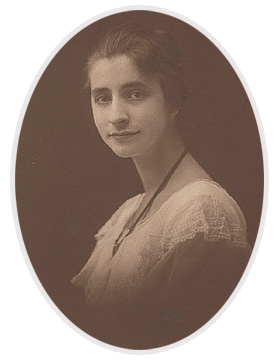
Ruth Hines Temple
The life and career of Ruth Hines Temple, long-time Head of the Art Department at Western Kentucky University, is documented in a new website created and maintained by the Kentucky Library & Museum. Born in Warren County in 1899, Temple lived to be 101. At an early age, she exhibited a penchant for art. After graduation from Randolph-Macon Woman’s College, she taught for one year at Leitchfield, Kentucky. Afterwards, she worked in her father’s store, the Busy Bee at 136 Main Street in Bowling Green, and did freelance graphic work.
After her father died in 1929, Temple and her mother operated the family store for five years prior to selling it as the Great Depression deepened. With money from the sale, Ruth completed her Master’s degree at Peabody College in Nashville. She also spent a summer at the Chicago Academy of Fine Art and traveled throughout the American South on a fellowship from Peabody.
Filed under Events
Kevin Renick impresses crowd at Java City
Singer/songwriter Kevin Renick for St. Louis, best known for his hit song “Up in the Air” thrilled the crowd today at Java City with his mellow and thoughtful music.
Filed under Events, Java City Concert
An Ohio Soldier in Bowling Green
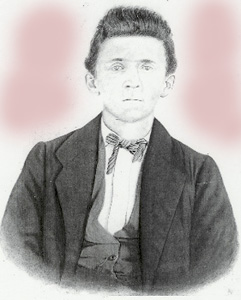
Lewis Gray Bowker, 1840-1863
WKU’s Special Collections Library continues to acquire Civil War manuscripts that relate to Bowling Green. Among recent additions are five letters written by Lewis Gray Bowker, a wagon maker who enlisted with the 111th Ohio Volunteer Infantry.
After seeing action near Covington, Kentucky, the 111th arrived in Bowling Green in mid-October, 1862 to protect the railroad line to Nashville. In a letter to his father, Bowker’s thoughts focused on home and what he was missing, including the birth of a child. “I hear from several sources and reliable ones too that we have a nice little girl,” he wrote. “She may be three years old before I see her again but I cannot think otherwise than that this terrible and unnatural rebellion will be closed before spring.”
A month later, Bowker wrote his wife Emily in a noticeably shakier hand. In hospital suffering from headache and fever, he encouraged her to keep replying to his letters even though “the Rebbles have … tore up the track between here and Louisville,” making mail delivery uncertain.
Like so many of his fellow soldiers who came through Bowling Green, Bowker died not of wounds but of disease in January, 1863, and a comrade sent his possessions home to Ohio. He wrote apologetically that the cold weather had made it difficult to wash and dress Bowker’s body properly, but gave assurances that his death had been peaceful.
A finding aid for Lewis Gray Bowker’s letters can be downloaded here. For more Civil War materials, search TopScholar and KenCat.
Filed under Manuscripts & Folklife Archives

